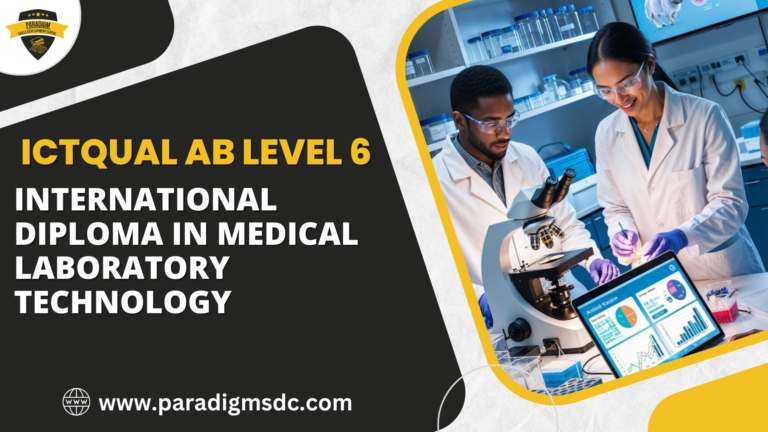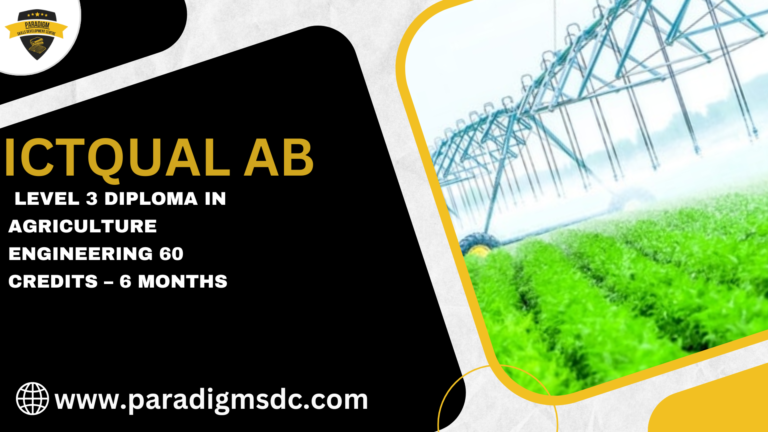Biotechnology Engineering is a rapidly growing field that merges biology with technology to address challenges in healthcare, agriculture, and environmental sustainability. The ICTQual Level 6 Diploma in Biotechnology Engineering (360 Credits) is a comprehensive, three-year program designed to equip students with the knowledge and skills to excel in this exciting domain.
This diploma provides an in-depth understanding of core biotechnology principles, engineering techniques, and their real-world applications. With 360 credits spread over three years, the course ensures a well-rounded education covering molecular biology, bioprocess engineering, bioinformatics, and more. The program integrates cutting-edge biotechnology advancements, preparing students to meet industry demands. ICTQual is recognized worldwide for its commitment to high-quality education standards.
This diploma is ideal for individuals passionate about science and technology and seeking to contribute to breakthroughs in biotechnology. Whether you’re a recent high school graduate or someone looking to pivot into this dynamic field, this program is designed to meet diverse needs.
Admissions for the ICTQual Level 6 Diploma in Biotechnology Engineering are now open. Visit the official ICTQual website to learn more about entry requirements, fees, and application procedures.
Study Units:
Year 1: Foundations of Biotechnology Engineering
- Introduction to Biotechnology
- Principles of Molecular Biology
- Basics of Biochemistry
- Fundamentals of Microbiology
- Introduction to Genetics and Genomics
- Principles of Cell Biology
- Mathematics for Biotechnology
- Fundamentals of Biostatistics
- Introduction to Engineering in Biotechnology
- Analytical Techniques in Biotechnology
- Basics of Bioinformatics
- Environmental Science and Sustainability
Year 2: Intermediate Biotechnology Concepts
- Bioprocess Engineering and Design
- Applied Microbiology and Industrial Applications
- Recombinant DNA Technology
- Biomaterials and Nanotechnology
- Immunology and Vaccine Development
- Protein Engineering and Enzyme Technology
- Bioinformatics Tools and Applications
- Environmental Biotechnology and Waste Management
- Bioreactors and Fermentation Technology
- Biomedical Engineering Basics
- Advanced Biostatistics and Data Analysis
- Ethical and Regulatory Aspects of Biotechnology
Year 3: Advanced Topics and Specialization
- Genetic Engineering and Genomic Editing
- Advanced Bioprocess Engineering
- Biotechnology Research Methods
- Pharmaceutical Biotechnology and Drug Development
- Systems Biology and Computational Modeling
- Agricultural Biotechnology and GMOs
- Industrial Biotechnology and Bioeconomy
- Synthetic Biology Applications
- Advanced Environmental Biotechnology
- Innovation and Entrepreneurship in Biotechnology
- Biotechnology Project Management
- Final Year Research Project
Learning Outcomes:
Learning Outcomes for the Level 6 Diploma in Biotechnology Engineering 360 Credits – Three Years:
Year 1: Foundations of Biotechnology Engineering
Introduction to Biotechnology
- Explain the scope, applications, and impact of biotechnology in various industries.
- Describe key concepts and terminologies in biotechnology.
Principles of Molecular Biology
- Understand the structure, function, and replication of DNA and RNA.
- Analyze molecular mechanisms of gene expression and regulation.
Basics of Biochemistry
- Identify the structure and function of biomolecules such as proteins, lipids, carbohydrates, and nucleic acids.
- Understand the principles of metabolic pathways and enzyme activity.
Fundamentals of Microbiology
- Describe microbial diversity, classification, and cellular structures.
- Apply basic microbiological techniques to culture and identify microorganisms.
Introduction to Genetics and Genomics
- Understand Mendelian inheritance and genetic variation.
- Explain genome organization and the role of genomics in modern biology.
Principles of Cell Biology
- Describe cell structure, function, and communication mechanisms.
- Analyze cell cycle processes and cellular responses to environmental stimuli.
Mathematics for Biotechnology
- Apply mathematical principles to solve problems in biotechnology.
- Use mathematical models for data interpretation in biological systems.
Fundamentals of Biostatistics
- Perform basic statistical analyses relevant to biotechnology research.
- Interpret experimental data using statistical tools and techniques.
Introduction to Engineering in Biotechnology
- Understand engineering principles applied in biotechnology processes.
- Explain the role of biotechnology in industrial applications.
Analytical Techniques in Biotechnology
- Demonstrate knowledge of spectroscopic, chromatographic, and imaging techniques.
- Apply these techniques to analyze biological samples.
Basics of Bioinformatics
- Use bioinformatics tools for DNA, RNA, and protein sequence analysis.
- Understand data mining and computational approaches in biotechnology.
Environmental Science and Sustainability
- Explain the role of biotechnology in environmental conservation.
- Understand sustainable practices for waste management and resource utilization.
Year 2: Intermediate Biotechnology Concepts
Bioprocess Engineering and Design
- Understand the principles of bioprocess development and scale-up.
- Design and optimize biotechnological processes for industrial applications.
Applied Microbiology and Industrial Applications
- Apply microbial biotechnology to industries such as food, pharmaceuticals, and agriculture.
- Analyze the role of microorganisms in biotechnological innovations.
Recombinant DNA Technology
- Perform basic techniques for DNA cloning, transformation, and expression.
- Understand the applications of recombinant DNA in research and industry.
Biomaterials and Nanotechnology
- Describe the properties and applications of biomaterials in biotechnology.
- Understand the role of nanotechnology in drug delivery and diagnostics.
Immunology and Vaccine Development
- Explain the components and functions of the immune system.
- Develop an understanding of vaccine production and immunotherapeutics.
Protein Engineering and Enzyme Technology
- Analyze protein structure-function relationships.
- Apply techniques to engineer enzymes for industrial applications.
Bioinformatics Tools and Applications
- Use advanced bioinformatics tools for genome annotation and functional analysis.
- Apply computational biology to solve biotechnological problems.
Environmental Biotechnology and Waste Management
- Understand biotechnological approaches to environmental restoration.
- Analyze strategies for bio-based waste recycling and pollution control.
Bioreactors and Fermentation Technology
- Explain the operation and design of bioreactors.
- Optimize fermentation processes for large-scale production.
Biomedical Engineering Basics
- Understand the integration of biotechnology and engineering in medical applications.
- Analyze the role of biomedical devices and technologies.
Advanced Biostatistics and Data Analysis
- Apply advanced statistical methods to analyze complex datasets.
- Interpret research findings using biostatistical software.
Ethical and Regulatory Aspects of Biotechnology
- Understand ethical considerations in biotechnology research and applications.
- Analyze global regulatory frameworks governing biotechnology practices.
Year 3: Advanced Topics and Specialization
Genetic Engineering and Genomic Editing
- Apply advanced techniques like CRISPR for genome editing.
- Understand ethical and societal implications of genetic engineering.
Advanced Bioprocess Engineering
- Design, optimize, and troubleshoot bioprocess systems.
- Analyze cost and efficiency aspects of industrial bioprocesses.
Biotechnology Research Methods
- Develop skills in experimental design and laboratory research.
- Conduct data collection and analysis for biotechnological research.
Pharmaceutical Biotechnology and Drug Development
- Understand the process of developing biopharmaceuticals.
- Analyze the role of biotechnology in personalized medicine.
Systems Biology and Computational Modeling
- Use computational models to study complex biological systems.
- Integrate omics data for systems-level understanding of biological networks.
Agricultural Biotechnology and GMOs
- Explain the principles of genetic modification in crops.
- Analyze the impact of agricultural biotechnology on food security.
Industrial Biotechnology and Bioeconomy
- Understand bio-based production of chemicals, fuels, and materials.
- Explore the economic and environmental impacts of industrial biotechnology.
Synthetic Biology Applications
- Design and construct synthetic biological systems.
- Analyze the applications of synthetic biology in diverse industries.
Advanced Environmental Biotechnology
- Apply advanced methods for bioremediation and sustainable development.
- Understand the role of biotechnology in mitigating climate change.
Innovation and Entrepreneurship in Biotechnology
- Develop entrepreneurial skills for biotechnology ventures.
- Analyze market trends and opportunities in the biotech industry.
Biotechnology Project Management
- Plan, execute, and manage biotechnology projects.
- Develop skills in budgeting, resource allocation, and team coordination.
Final Year Research Project
- Conduct independent research on a selected topic in biotechnology.
- Present findings in a professional report and defend them during evaluation.







